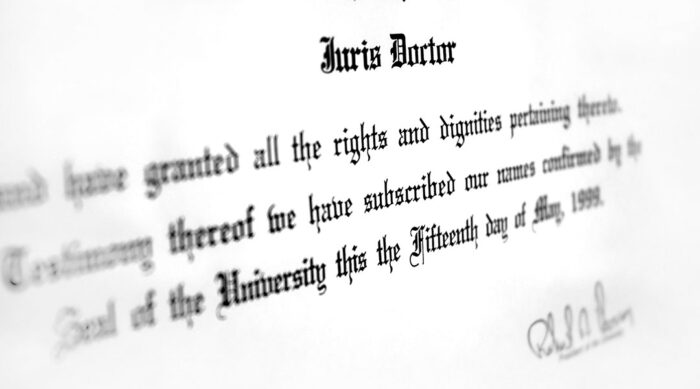
Incidents of defamation and online harassment have become increasingly prevalent as society relies more and more on the internet to communicate and share information. The increased use of social media to connect, in both personal and professional settings, has played a particularly significant role in the rise of defamatory attacks. Defamation has always been a difficult claim to pursue, regardless of whether it occurs online or in more traditional forms, so if you unfortunately find yourself as a victim of defamation or online harassment, it’s important to select an attorney capable of navigating the tricky landscape of your case.
Buckingham lays out the most important factors for you to consider when selecting an attorney to pursue your defamation matter.
What is Defamation?
Generally speaking, defamation is the act of communicating false and damaging statements about a person or organization to a third party. Today, many defamation claims arise through publication of false statements on the internet (internet defamation or cyber-libel). Needless to say, it’s easier than ever to disseminate false and harmful information to a large audience, and, as new forms of communication develop, so do the ways in which one can fall victim to defamation.
If you have been defamed online, whether professionally or personally, and are ready to pursue the individual responsible, the next step is choosing the right attorney to discuss your issues and represent you in your action.
Why Do I Need a Lawyer for My Defamation Case?
Defamation cases are often highly complex and there are many steps that you need to take right away to ensure that you are successful in pursuing your case. If you suspect you’re being defamed online, you should reach out to an experienced defamation attorney to discuss options for handling attacks on your reputation and ensure you are protecting your rights moving forward. Having an attorney on your team can be a great way to make sure that you are able to successfully navigate these initial steps and to put you in the best position to succeed in your case.

How to Choose a Defamation Attorney
Picking the right attorney in any matter can be difficult, but is especially difficult in defamation cases, given the nuances associated with the practice area. The right attorney can make all the difference in being successful in your matter, from proving damages to gathering evidence. Below is a list of criteria to consider when choosing the right defamation attorney.
- Specialization
While having a specialization is not a requirement to handling a case, retaining an attorney who focuses their practice on defamation can be incredibly valuable when pursuing a defamation case. Defamation claims, like many claims that implicate constitutional issues, involve nuanced legal rules, privileges, and defenses that need to be considered before moving forward with a lawsuit. Likewise, knowledge of such rules is integral to successfully navigating the litigation process and demonstrating the strength of your claims to your opponent. Before choosing an attorney, you should always evaluate whether they focus or specialize in a relevant field, or at least have handled cases in that field previously.
- Reputation and Credibility
You should also research an attorney’s reputation when deciding on representation. While online reviews can be beneficial, it is also important to look for client testimonials, as well as the attorney’s overall reputation in the legal community. A respected and reputable defamation attorney is likely to have positive feedback from current or former clients and also a strong network of legal professionals.
Many states also will allow potential clients to review an attorney’s disciplinary record. This allows potential clients to confirm the attorney’s registration, review any disciplinary record, and see details about how long the attorney has been licensed. Being comfortable with your attorney’s reputation and background is important to establish trust and build a strong attorney-client relationship.
- Communication and Personal Compatibility
Defamation cases are extremely stressful and very personal. To be successful in your case, you will need to have a strong relationship with your attorney. Clear and effective communication is crucial in any legal case, and the foundation upon which a strong attorney-client relationship is built. You should make sure that your defamation attorney has an established strategy for communication, but also be willing to work with you to tailor their strategy to your specific needs and comfort level.
Similarly, you will be working closely with your defamation attorney throughout your matter, so it is crucial that you are personally compatible. You need to be comfortable discussing highly personal and sensitive matters with your attorney. Having a good rapport, based on trust and empathy, will help you be more comfortable in discussing these situations.
- Fee Structure
Finally, defamation cases can be highly complex and time-consuming, which also means expensive. It’s important to have a very transparent relationship with your defamation attorney when it comes to costs and payment structure. Disputes regarding billing and payments can quickly erode the attorney client relationship and derail your defamation case at any moment. Make sure that you understand, and are comfortable with, all the fee arrangements proposed by the attorney.

Next Steps
Choosing the right defamation attorney is a critical decision that can drastically impact your defamation case. Defamation cases are highly intricate and highly personal. Having a skilled, trusted attorney by your side can help you navigate the various challenges that will inevitably arise during your case. By considering these factors, you can make an informed decision that maximizes your chances of achieving a favorable outcome in your defamation case.